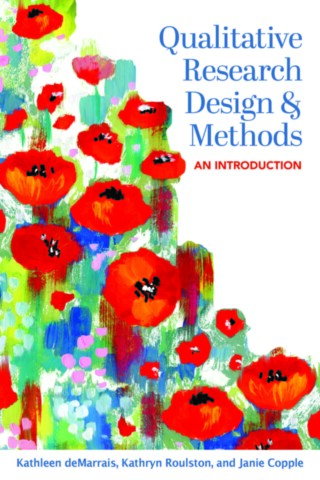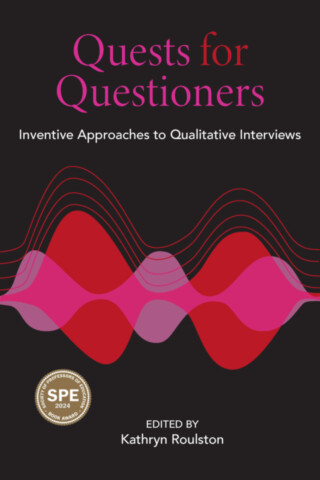Kathryn Roulston
Kathryn Roulston is Professor of Qualitative Research in the Mary Frances Early College of Education at the University of Georgia. Her research interests include qualitative research methods, qualitative interviewing, and analyses of talk-in-interaction. She is the author of Interviewing: A Guide to Theory and Practice (2022), Exploring the Archives: A Beginner’s Guide for Qualitative Researchers (with K. deMarrais, 2021), and editor of Interactional Studies of Qualitative Research Interviews (2019). She has contributed chapters to handbooks of qualitative research as well as articles to Qualitative Research, Qualitative Inquiry, the International Journal of Research and Method in Education, and the International Journal of Qualitative Methods, among other journals. In her spare time, she enjoys textile arts, including hand-dyeing, spinning, and weaving.
Books by Kathryn Roulston:

2025 SPE Outstanding Book Award Winner
2024 AESA Critics' Choice Award Winner
Written by scholars from three generations of qualitative methodologists, Qualitative Research Design and Methods: An Introduction situates qualitative research within the history of the field and integrates this history within discussions of specific research designs. This novel approach allows readers to come to know the genealogy of the field and how previous generations of scholars have informed what we know today as qualitative research. The text reflects these more traditional as well as emerging qualitative research approaches, providing a theoretically grounded approach to designing and implementing qualitative research studies. While some introductory research texts focus on the specific methods of qualitative research with little attention to the role of theory, this book forefronts theory in qualitative research. The authors speak to students new to qualitative research with clear discussions of theory and theoretical concepts and how those notions must be considered throughout all aspects of research design, implementation, and representation of findings. Each chapter integrates discussion of theory. In addition, the book highlights the role of ethics in the same way with a chapter at the beginning as well as discussions of ethics threaded throughout each of the design chapters.
Qualitative Research Design and Methods is THE introductory textbook for students taking introductory masters and doctoral courses in qualitative research. Instructors in those classes will appreciate the straightforward language and concepts provided by the authors.
Perfect for courses such as: Introduction to Qualitative Research and Qualitative Research Design
Library E-Books
We are signed up with aggregators who resell networkable e-book editions of our titles to academic libraries. These editions, priced at par with simultaneous hardcover editions of our titles, are not available direct from Stylus.
These aggregators offer a variety of plans to libraries, such as simultaneous access by multiple library patrons, and access to portions of titles at a fraction of list price under what is commonly referred to as a "patron-driven demand" model.
E-books are now distributed via VitalSource
VitalSource offer a more seamless way to access the ebook, and add some great new features including text-to-voice. You own your ebook for life, it is simply hosted on the vendor website, working much like Kindle and Nook. Click here to see more detailed information on this process.

2024 AESA Critics' Choice Award Winner
2024 SPE Outstanding Book Award Winner
This edited book presents a range of quests for those who want to learn from others through asking questions in research interviews and conversations and attending to the more-than-human aspects of the world. Authors in this book explore how to talk to people in ways that are responsive to cultural contexts and the challenges faced by people in everyday life, how to think with concepts drawn from an array of theories, including Karen Barad’s concept of “intra-action,” Rosi Braidotti’s work on “cartographies,” and Gilles Deleuze and Félix Guattari’s concepts of the “fold” and “assemblage.” Authors discuss a rich array of interview practices used by contemporary scholars—including, how to
a. elicit verbal accounts from participants in culturally responsive ways;
b. think with theory in relation to the use of interview methods; and
c. integrate object, graphic, and photo elicitation methods and mobile and walking methods in research.
The book is designed to provoke and inspire readers’ creativity to take risks and integrate different approaches to doing interviews in their research—in other words, to undertake methodological quests to experiment with the art of asking questions. Understanding the breadth of practices entailed in qualitative interview research can invigorate any researcher’s practice. This volume seeks to encourage researchers to design studies that account for how they interact with others in culturally responsive ways; to consider how they can draw on theoretical concepts to re-think, re-theorize, and question conventional interview practices; and to re-imagine the generation of interview accounts using other ways of knowing, including visual, sensory, and mobile methods.
Perfect for courses such as: Introductory Research Methods │Introductory Qualitative Methods │Qualitative Research Design │Interview Research │Qualitative Data Collection
Library E-Books
We are signed up with aggregators who resell networkable e-book editions of our titles to academic libraries. These editions, priced at par with simultaneous hardcover editions of our titles, are not available direct from Stylus.
These aggregators offer a variety of plans to libraries, such as simultaneous access by multiple library patrons, and access to portions of titles at a fraction of list price under what is commonly referred to as a "patron-driven demand" model.
E-books are now distributed via VitalSource
VitalSource offer a more seamless way to access the ebook, and add some great new features including text-to-voice. You own your ebook for life, it is simply hosted on the vendor website, working much like Kindle and Nook. Click here to see more detailed information on this process.

A 2022 SPE Outstanding Book Award Winner
This book offers qualitative researchers an entrée into the world of working with archival repositories and special collections. It serves as a primer for students and researchers who might not be familiar with these sorts of collections, but with an interest in what has become known as the “archival turn,” in which the use of archival materials and artifacts in contemporary research has increased dramatically since the 1990s. Suited to novice researchers seeking a general introduction into how special collections are created and how they can be used, the book offers useful, clear guidance on using different types of archives, developing topics for research within the archives, assessing materials available, how to work with archivists and curators, documenting the research process, and writing up an archival study. Archival records and material culture (including manuscripts, documents, audio- and video-recordings, and visual and material culture) housed in special collections provide a wealth of resources for qualitative researchers seeking to conduct research in the social sciences.
Library E-Books
We are signed up with aggregators who resell networkable e-book editions of our titles to academic libraries. These editions, priced at par with simultaneous hardcover editions of our titles, are not available direct from Stylus.
These aggregators offer a variety of plans to libraries, such as simultaneous access by multiple library patrons, and access to portions of titles at a fraction of list price under what is commonly referred to as a "patron-driven demand" model.
E-books are now distributed via VitalSource
VitalSource offer a more seamless way to access the ebook, and add some great new features including text-to-voice. You own your ebook for life, it is simply hosted on the vendor website, working much like Kindle and Nook. Click here to see more detailed information on this process.



